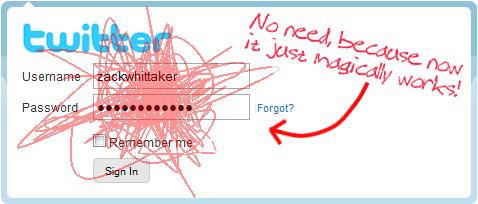Let's get rid of usernames and passwords for good

Usernames and passwords annoy me. Expert advice says to have a different username and password for various services, but the amount of subscriptions, email accounts, social networks and other sites we subscribe to can run into the dozens, if not hundreds.
Password managers help, and single sign-on solutions for an array of sites are useful, and devices like smart cards and biometric devices save us remembering a whole array of combinations. But what if you're away from your primary computer? You still need to remember all of the sequences and mishmashes of letters and numbers whether you like it or not.

Facebook Connect has helped me out greatly. On my home computer, I never sign out because there's just no point as nobody else lives with me (thank God), and on my office computer, I always lock my screen so again, no need to log out. With this, it means I can not only sign in straight away to supporting services but it means I can cut down on the number of user names and passwords I need.
Perhaps it is time we worked on a new system. No longer should be need to push the "forgot your password?" link, or have to look up a long list of passwords in the filing cabinet, or even have to rely on a browser to take the workload for us. There needs to be a solution.
OpenID has the right idea, but it works in a similar way to university federation services and doesn't really share any unique factor. Even CBS Interactive sites like ZDNet, TechRepublic, and BNET have a good idea by sharing the same login details across sites so you don't need to re-register. But again, this isn't enough.
I'd like something to change but simply don't see a system being implemented which wouldn't cost about a zillion dollars. For now, this thirty-year solution may have to stick with the byline of "if it ain't broken, don't fix it". Then again, Google thought e-mail was broken when it brought out Wave...